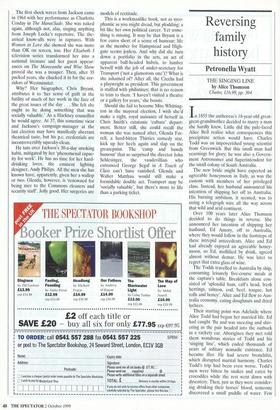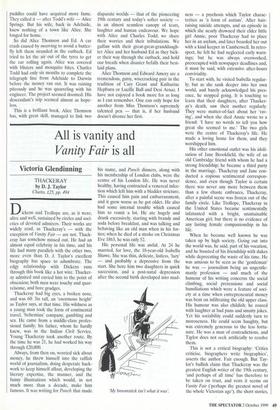Reversing family history
Petronella Wyatt
THE SINGING LINE by Alice Thomson Chatto, £16.99, pp. 304
In 1855 the authoress's 18-year-old great- great-grandmother decided to marry a man she hardly knew. Little did the pale-faced Alice Bell realise what consequences this precipitate action would have. Charles Todd was an impoverished young scientist from Greenwich. But this small man had yearnings for glory; he was also a. Govern- ment Astronomer and Superintendent for the small colony of South Australia.
The new bride might have expected an agreeable honeymoon in Italy, as was the custom with members of her privileged class. Instead, her husband announced his intention of shipping her off to Australia. His burning ambition, it seemed, was to string a telegraph wire all the way across that wild and arid continent.
Over 100 years later Alice Thomson decided to do things in reverse. She announced her intention of shipping her husband, Ed Amory, off to Australia, where they would follow in the footsteps of these intrepid antecedents. Alice and Ed had already enjoyed an agreeable honey- moon, so Ed, mollified by drink, agreed almost without demur. He was later to regret that extra glass of wine.
The Todds travelled to Australia by ship, consuming leisurely five-course meals at the captain's table. Breakfasts alone con- sisted of 'splendid ham, calf s head, fresh herrings, salmon, cod, beef, tongue, hot rolls and honey'. Alice and Ed flew to Aus- tralia economy, eating doughnuts and dried lychees.
Their starting point was Adelaide where Alice Todd had begun her married life. Ed had caught 'flu and was sneezing and shiv- ering as the pair headed into the outback in a rackety car. Aborigines they met told them wondrous stories of Todd and his 'singing line', which ended thousands of years of solitary nomadic existence. Ed became iller. He had severe bronchitis, which disrupted marital harmony. Charles Todd's trip had been even worse. Todd's men were bitten by snakes and eaten by crocodiles while the rest went down with dysentery. Then, just as they were consider- ing drinking their horses' blood, someone discovered a small puddle of water. Few puddles could have acquired more fame. They called it — after Todd's wife — Alice Springs. But his wife, back in Adelaide, knew nothing of a town like Alice. She longed for home.
So did Alice Thomson and Ed. A car crash caused by swerving to avoid a butter- fly left them stranded in the outback. Ed tried to let the air out of the tyres to get the car rolling again. Alice was covered with blisters and mosquito bites. Charles Todd had only six months to complete the telegraph line from Adelaide to Darwin before the money ran out. It was raining piteously and he was quarreling with his engineer. The project seemed doomed. His descendant's trip seemed almost as hope- less.
This is a brilliant book. Alice Thomson has, with great skill, managed to link two disparate worlds — that of the pioneering 19th century and today's softer society — in an almost seamless canopy of tears, laughter and human endeavour. We hope with Alice and Charles Todd; we share their worries and their tribulations. We guffaw with their great-great-granddaugh- ter Alice and her husband Ed as they bick- er their way through the outback, and hold our breath when disaster befalls their best- laid plans.
Alice Thomson and Edward Amory are a tremendous, gutsy, wisecracking pair in the tradition of Cary Grant and Katharine Hepburn or Lucille Ball and Desi Arnaz. I have not enjoyed a book more for as long as I can remember. One can only hope for another from Miss Thomson's supremely talented pen — that is, if her husband doesn't divorce her first.











































































 Previous page
Previous page